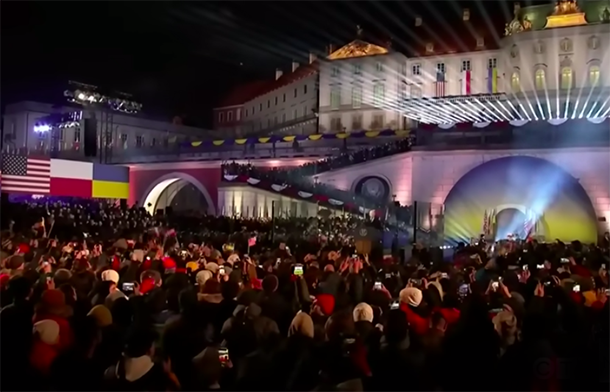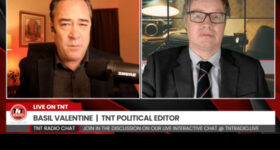
Arnaud Develay
21st Century Wire
The Ukraine conflict is a the gift that keeps on giving, as it defies all preconceived notions of what passes for “European unity” today.
Not content with revealing to the whole world the utter moral decay of a European political class incapable to remotely stand up to the US and preserve the interests of its own populations, the very unity of the EU now threatens to unravel at the seams.
It’s no coincidence that US President Joe Biden ended his wartime photo-op tour in Warsaw, Poland – after appearing just days before alongside Ukrainian President Zelensky in the western media’s ‘war zone’ theme park in Kiev. Speaking in front of an ominous and dark backdrop, Biden delivered angry, almost menacing address, imploring Poland and Europe to continue ploughing weapons and other ‘support’ into Ukraine in order to wage an open-ended war against Russia.

IMAGE: Joe Biden’s dark address in Warsaw reminicent of a midnight rally at Nuremberg.
Ironically, the recent revelations published by American famed investigative journalist Seymour HERSH bearing on the identity of the authors behind the explosions of Nordstream 2 might have played the role of an accelerator in widening the cracks within the increasingly fragile BRUSSELS coalition.
It all began back in September of last year when the main energy lifeline to Europe’s shaky economic prospects, the Nordstream pipelines connecting Germany and Russia, was attacked in a series of underwater explosions which everybody was quick to attribute to (you guessed it) Russia.
The reflexive nature in which the western mainstream media moved to blame Russia for blowing-up its own key energy infrastructure, was as strong indicator as any that the western politicians and their media agents had summarily closed ranks on the story, and that a wide-scale cover-up was under way.
SEE ALSO: INTERVIEW: Arnaud Develay – Nord Stream Attack: A Prelude to War?
While any attack on a major Russian asset by the West should be considered a major cause of concern, the other half of the conclusion from Hersh’s bombshell report is perhaps even more shocking: the United States and its NATO allies have attacked the essential energy infrastructure of a fellow NATO member Germany – a radical move which could irrevocably alter the relationship between the US, NATO, and its now contentious ally Germany.
About the same time (and while on the whole underreported by the media), the Polish (nationalist) government of Mateusz Morawiecki decided via its Foreign Ministry to send the government of Germany a diplomatic note bearing on a renewed request for war (World War II) reparations.
The note featured essentially three separate parts:
1. Poland’s demands that It be paid the sum of 1.3 trillion Euros in compensation for the estimated loss of productive wages occasioned by the disappearances of its citizens following Nazi Germany’s occupation and looting of the country.
2. Poland’s demands that Germany proceed to repatriate cultural artefacts
3; Poland’s demands that ethnic Poles living in Germany be granted the status of “national minority”
The note was delivered to Berlin authorities on October 3rd 2022; a mere few days following Nordstream 2 pipeline being blown up on September 26th.
It beggars belief that officials in Warsaw would have been so tone deaf so as to believe that Berlin would not have had the proverbial “better fish to fry” in the wake of Germany and Russia’s recently completed energy pipeline project – being reduced to smouldering submarine ashes and thus – essentially tolling the bell for Europe’s energy, and thus economic (and political) independence.
As if to illustrate the dire consequences of what is increasingly being touted by the West as an act of international terrorism committed against its own (GAZPROM technically owns the pipeline) infrastructures, Moscow called for an emergency UN Security Council meeting to address this matter. Germany understandably took three full months to ponder the matter before rejecting outright Poland’s demands in an official response delivered on January 3rd, 2023.
Its content was not rendered public by the Polish Ministry of Foreign Affairs, but was alluded to by the country’s Minister for European Affairs, Szymon Szynkowski vel Sęk on Polish radio as thus:
“The position of the German government has been known for a long time, but this is certainly not the end of the matter (…) Our position on this matter is completely different. This is certainly not the end, this is just the beginning of this matter. Today, the request of the deputy head of the Ministry of Foreign Affairs Arkadiusz Mularczyk to the UN is addressed to take up this topic as well, just reparations; action is being carried out in relation to forums of other international organisations.’
On the same day, Warsaw announced through its Deputy Minister of Foreign Affairs, Arkadiusz MULARSCZYK that Germany’s reply exhibited a “disrespectful attitude”, and he deplored the double standards adopted by Berlin when referring to Germany’s compensation towards African countries such as Namibia.
In BERLIN, the then Minister of Foreign affairs, Annalena Baerbock, commented on Poland’s demands: “The issue’s closed”.
This prompted Warsaw to promise to take the issue to “international fora”.
In a recently-completed trip to the US, Arkadiusz MULARSCZYK met with US Congress Representative from both political parties after which he declared:
“Many congressmen were surprised that Germany never paid war reparations. What’s more, they were surprised that the Germans robbed Poland so much and had no intention of giving it back. Especially here in the United States, where property rights are so strong and strong, many congressmen were shocked that Germany had robbed Poland, stolen artwork, bank resources, and to this day has not accounted for it. It was a cognitive shock for them, so I think that there is room for cooperation, because Germany’s behavior does not comply with the standards of the rule of law, protection of human rights, compliance with international law in the world. I hope that this matter will be step by step, week by week, month by month, the subject of interest and cooperation, but of course it takes time .”
A Parliamentary Election Season Fraught With Risks
The recent sequence which saw Germany somewhat drag its feet in committing to increased military assistance to Ukraine obviously did not go down well with Washington.
Now Poland aims to take the lead in becoming Washington’s ‘most reliable partner’ in confronting Russia in this escalating proxy war.
In addition, the upcoming parliamentary elections in Poland dictate that the ruling party in charge adopt a somewhat confrontational approach with Germany, so as to divert public attention from the piling up of social problems in Poland itself.
Since the start of Russia’s Special Military Operation in Ukraine, Poland has committed itself to absorbing millions of refugees from Ukraine.
This has led to the infliction of great stress on the country’s social welfare system, and increased social tensions between Polish residents and the influx of refugees.
As a result, “Ukraine fatigue” is now threatening to engulf the population and the incumbents political class currently faces prospects of a backlash at the ballot box.
Opening a dispute with Germany stands as the perfect antidote to deflect attention on these structural problems and Warsaw hopes to emulate Ukraine and reap concrete benefits from an all-out charm offensive in Washington and at the UN even if the demands communicated to BERLIN stand no chance of prospering legally-speaking.
Jockeying for U.S. Saviours
This latest emerging schism is best viewed through the lens of long-term Anglo-American geopolitical grand strategy.
If this politico-legal maneuver is not serious in and of itself itself, it does translate in terms of profound geopolitical upheavals on the European continent as 20 years ago, former Secretary of Defense Donald Rumsfeld popularized the term “New Europe.”
The Neoconservatives of the time had identified in some countries of the former Soviet bloc (including Poland), a propensity to design a foreign policy based on a blind and overzealous obedience to American promises.
To wit, for several years Poland has been using its share of European funds to supply itself with American F-35s, ignoring admonitions from Paris and Berlin on the importance of buying European armaments.
Succumbing to Washington’s sirens, Warsaw has already announced that it intends to become the major military power on the European continent.
On top of this, during a recent interview on the American broadcast media outlet CBS program, “Face the Nation,” Polish Prime Minister Mateusz Morawiecki stated that Poland was in discussions with the Biden administration over making the U.S. presence in Poland “more permanent”, alluding to a permanent military base housing troop numbers larger than the current contingent of 11,000. This would be a marked expansion of an already massive US military footprint stationed in Germany.
It is necessary to put into perspective the most relevant (and most hidden) element in this game of fools: Poland owns one of the complex used in the conversion of American Liquefied Natural Gas on which Germany relies most to keep powering its own economy.
When assembling all the pieces of the puzzle, there emerges a European geopolitical landscape profoundly different from the one that existed before February 24, 2022. In addition, Poland is all but certain to become the main transit (and therefore distribution) centre for US liquefied natural gas in Europe, and thus requiring ‘protection’ from Washington.
Not surprisingly, this strategic lever will require Poland to significantly increase its military potential in order to prevent any potential threat of destabilization by Russia. The nationalist party in power thus appears ideally positioned to implement the next stage of its project: restore the intermarium.
Joseph Biden’s visit this week is to be taken as an endorsement of Poland’s rise to prominence as Washington’s most reliable partner even though history tells us that America won’t hesitate to jettison its erstwhile ally – if and when circumstances require this to be done.
***
Author Arnaud Develay was trained as an attorney specializing in humanitarian and international criminal law. A member of both the Paris and Washington state bar, he started his career under former US Attorney General Ramsey Clark’s mentorship before moving to represent Ilitch Ramirez Sanchez aka ‘Carlos’, senior representatives of the Yellow Vest Movement, and Moldova’s former Vice-Prime Minister, Iurie Rosca. He now works as a political consultant. Visit Arnaud’s archive here.
References:
1. How America Took Out The Nord Stream Pipeline (substack.com)
2. Poland seeks $1.3 trillion from Germany in reparations for World War II (nbcnews.com)
3. Surprise! Germany refuses to pay reparations, PiS goes to the UN and threatens… America – OKO.press
5. Polish cities feel the strain of helping Ukrainian refugees – POLITICO
7. Poland inks $4.6 billion contract for F-35 fighter jets (defensenews.com)
8. Gung-ho Poland is becoming a military leader in Europe | World | The Times
9. Poland could build second unit to receive LNG amid Czech, Slovak interest | Reuters
10. Poland’s role in the Intermarium idea (blue-europe.eu)
11. Biden to discuss more troops in upcoming visit, Polish PM says | Reuters
Author Arnaud Develay is a lawyer specializing in international criminal law. He began his career in 2005 under the mentorship of former United States Justice Minister Ramsay Clark defending former Iraqi President Saddam Hussein and his companions. He then participated in the defense of Ilitch Ramirez Sanchez (Carlos), advised certain figures of the Constituent Yellow Vests Movement, before spending two years in the Syrian Arab Republic reporting on the deleterious effects of Washington’s CAESAR sanctions regime.
READ MORE POLAND NEWS AT: 21st Century Wire Poland Files
ALSO JOIN OUR TELEGRAM CHANNEL
PLEASE HELP SUPPORT OUR INDEPENDENT MEDIA PLATFORM HERE















